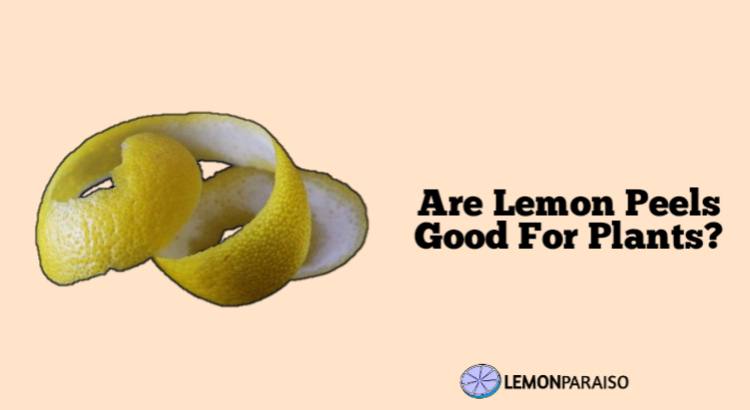Are Lemon Peels Good for Plants? Unveiling Nature’s Zesty Secret for Thriving Gardens

Are you a plant lover seeking natural ways to give your leafy friends a boost? Well, you might be surprised to learn that the secret to their success could be hiding right in your fruit bowl! Yes, we’re talking about lemon peels. These zesty little wonders are not just perfect for adding a tangy twist to your recipes but can also work wonders for your plants.
Packed with essential nutrients and boasting a variety of other benefits, lemon peels might just be the refreshing solution your green companions have been craving. So, let’s dive into the juicy details and find out if are lemon peels good for plants.
Are Lemon Peels Good For Plants?
Lemon peels are indeed good for plants, primarily due to their high nutrient content. They contain significant amounts of calcium, potassium, phosphorus, and other micronutrients that are essential for plant growth.
When incorporated into the soil, these nutrients are slowly released, providing a natural and organic fertilizer that can help nourish plants and stimulate growth. Moreover, lemon peels contain citric acid, which can help to break down minerals in the soil, making them more accessible for plants to absorb.
Can Lemon Peels Be Used As Fertilizer?
Lemon peels can indeed be used as a natural and organic fertilizer for your plants. Rich in essential nutrients such as calcium, potassium, and phosphorus, as well as micronutrients, lemon peels can provide the nourishment plants need to thrive.
As they decompose, these nutrients are gradually released into the soil, making them available for plants to absorb. Additionally, the citric acid in lemon peels helps to break down minerals, further facilitating nutrient uptake.
By using lemon peels as a fertilizer, gardeners can not only promote plant growth but also reduce their reliance on chemical fertilizers, contributing to a more sustainable and environmentally friendly garden.
Are Lemon Peels Good For Tomato Plants?
Lemon peels can be beneficial for tomato plants when used appropriately, as they provide valuable nutrients and serve as a natural pest repellent. The high concentration of essential nutrients, such as calcium, potassium, and phosphorus, in lemon peels can contribute to the overall health and productivity of tomato plants.
Calcium, in particular, is crucial for preventing blossom end rot, a common problem that affects tomatoes. Additionally, the strong citrus scent of lemon peels can deter pests like aphids and slugs, which can otherwise cause damage to tomato plants.
However, it is essential to use lemon peels sparingly to avoid making the soil too acidic, which can be detrimental to the growth and development of tomato plants.
Can You Compost Lemon Peels?
Yes, you can compost lemon peels. Composting is an environmentally friendly way to recycle organic waste and create nutrient-rich soil for your plants. Lemon peels, along with other citrus fruit peels, can be added to your compost pile or bin as part of the “green” or nitrogen-rich component.
However, it is important to balance the lemon peels with “brown” or carbon-rich materials such as dry leaves, straw, or shredded paper to maintain an optimal carbon-to-nitrogen ratio in the compost.
While lemon peels can take longer to decompose compared to other fruit and vegetable scraps due to their tougher texture, chopping them into smaller pieces can help speed up the process.
Additionally, be aware that the citric acid and strong scent of lemon peels can make them unappealing to some beneficial microorganisms and worms that aid in the decomposition process. To mitigate this, ensure that you add lemon peels in moderation, interspersed with other types of organic waste, to maintain a healthy and diverse compost environment.
How Do You Use Lemon Peels In Gardening?
Lemon peels can be used in gardening in various ways to enhance plant growth and health. You can bury small pieces of lemon peels near the roots of your plants, allowing them to decompose and release nutrients into the soil.
Another method is to create a lemon peel infusion by soaking peels in water for a few days, then using the infused water to nourish your plants. Additionally, you can scatter lemon peels around your garden as a natural pest repellent to protect your plants from common pests.
Can Lemon Peels Help Repel Pests In The Garden?
Yes, lemon peels can help repel pests in the garden, as their strong citrus scent acts as a natural deterrent for pests like aphids, ants, and slugs. By placing lemon peels around your plants or garden beds, you can create a protective barrier that discourages these pests from approaching.
This method reduces the need for chemical pesticides, promoting a healthier and more eco-friendly gardening environment. Keep in mind, however, that lemon peels may not be effective against all types of pests, and additional pest control measures may be necessary in some cases.
How Often Should You Use Lemon Peels On Plants?
The frequency of using lemon peels on plants depends on the specific needs of your garden and the plants you are growing. As a general rule, you can use lemon peels once every few weeks or monthly during the growing season to provide a steady supply of nutrients.
Be cautious not to overuse lemon peels, as excessive application can lead to overly acidic soil conditions, which can be harmful to some plants. Monitor your plants’ health and adjust the frequency of using lemon peels accordingly to ensure optimal growth and well-being.
Are There Any Plants That Should Not Be Treated With Lemon Peels?
Plants that prefer alkaline soil, such as lilacs, clematis, and some types of hydrangeas, may not benefit from treatment with lemon peels, as the citric acid in the peels can lower the soil pH and create a more acidic environment.
To maintain the health of these plants, it is best to avoid using lemon peels and opt for alternative organic fertilizers or compost that better suit their soil preferences. Always research the specific needs of your plants before applying any amendments to ensure compatibility.
Can You Use Lemon Peels On Indoor Plants?
Yes, lemon peels can be used on indoor plants, offering similar benefits as they do in outdoor gardens. You can create a lemon peel infusion by soaking peels in water and using the nutrient-rich water to irrigate your indoor plants, providing them with essential nutrients.
Additionally, the citrus scent of lemon peels can help deter pests that may invade your indoor garden, such as aphids or ants. Be sure to use lemon peels in moderation to avoid creating overly acidic soil conditions for your indoor plants.
Are There Any Risks To Using Lemon Peels On Plants?
While lemon peels can offer numerous benefits to plants, there are potential risks to consider. Overusing lemon peels can lead to overly acidic soil conditions, which may be detrimental to some plants, particularly those that prefer alkaline soil.
Furthermore, the strong scent of lemon peels may deter beneficial insects or worms that contribute to a healthy garden ecosystem. To minimize these risks, use lemon peels in moderation, balancing them with other organic materials and fertilizers, and regularly monitor the health and well-being of your plants.
Conclusion: Are Lemon Peels Good For Plants?
In conclusion, lemon peels can be highly beneficial for plants in various ways. They are a rich source of essential nutrients, act as a natural fertilizer, help break down minerals in the soil, and serve as a pest repellent. Incorporating lemon peels into gardening practices, such as composting or using them as infusions or soil amendments, can promote plant growth and reduce reliance on chemical fertilizers.
However, it is important to use lemon peels in moderation and consider the specific needs of different plants, as some may not thrive in acidic soil conditions. By understanding how to use lemon peels effectively and being mindful of potential risks, gardeners can harness their potential to create healthier and more sustainable gardens.

